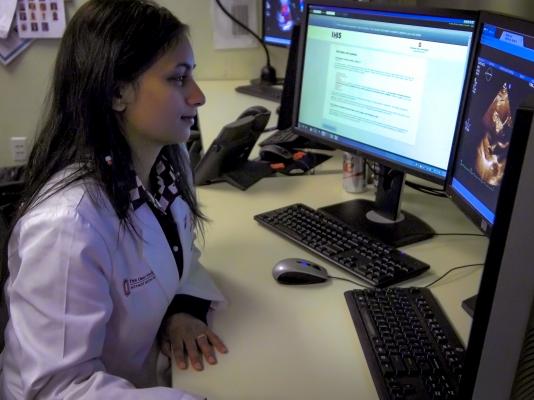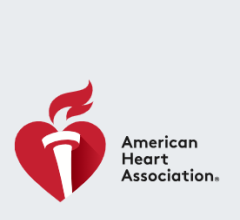
Laxmi Mehta, M.D., reviews an echocardiogram at The Ohio State Wexner Medical Center. She is calling for more research and collaboration to examine the link between heart disease and breast cancer to develop new treatments and preventative measures.
February 1, 2018 – Heart disease and breast cancer are two of the most prevalent diseases among women in the United States. Heart disease, the No. 1 killer of women, is responsible for one in three deaths, while one in eight women develops invasive breast cancer in her lifetime. These two major threats to women’s health are connected, where cancer treatments chemotherapy or radiation therapy can damage the heart.
The American Heart Association released the first scientific statement Feb. 1 about the two diseases, calling for more research and collaboration between the fields of oncology and cardiology to treat and prevent both diseases.[1] The statement provides a concise document for the medical community on the overlap between heart disease and breast cancer in terms of risk factors, the treatment and preventative therapies.
“Some treatments that a woman may undergo for breast cancer such as chemotherapy and radiation can result in heart disease. Additionally, if a woman has underlying heart disease when she is diagnosed with breast cancer, that can limit her treatment options,” said Laxmi Mehta, M.D., author of the scientific statement and director of the Women’s Cardiovascular Health Program at The Ohio State University Wexner Medical Center. “That’s why these two disease entities have to be merged together to explore new treatments and preventative measures.”
Mehta hopes the scientific statement will prompt the medical community to work together to more closely screen cancer patients for heart disease and do more to protect their heart health during and after treatment.
The link between breast cancer and heart disease begins with some common risk factors such as obesity and sedentary lifestyle. Women who follow the American Heart Association’s recommendations for a healthy lifestyle are not only more likely to keep their heart healthy, they are also less likely to develop breast cancer. “Things like staying active, eating a heart healthy diet, maintaining a healthy weight and avoiding smoking are all important to preventing both diseases from developing,” Mehta said.
Expansion of the Cardio-oncology Subspecialty
Mehta said cardio-oncology is an emerging field where oncologists and cardiologists work together to care for cancer patients. The main focus is gathering base-line cardiac function information and then monitoring the patient through cancer treatments to ensure the heart is not permanently damaged. While a cancer might be forced into remission by a therapy, patients often develop heart failure or other cardiac complications as a side effect. Older breast cancer patients more often die of heart disease than from the cancer itself.[2]
“There has to be growing research in this area and so the field of cardio-oncology has really boomed,” Mehta said. “It’s still on the rise, it’s still in its infancy, but I’m hoping that this paper can help drive more interest in that area as well.”
She said many hospitals are now developing cardio-oncology programs. “They look at patients who’ve had, who have cancer and end up developing cancer or who have cancer and already have underlying heart disease and try to figure out what’s the best treatment to cure their cancer and have them survive their cancer, and then also take care of their hearts,” Mehta explained.
Watch the VIDEO: Linking Breast Cancer Treatment to Cardiac Issues, where Mehta explains a patient case frokm her center, including an interview with the patient.
Watch the VIDEO: Assessing Cardiotoxicity Response With Cardio-Oncology Echo Imaging.
Read the article Assessing Cardiotoxicity Due to Cancer Therapy.
References:


 November 14, 2025
November 14, 2025 









